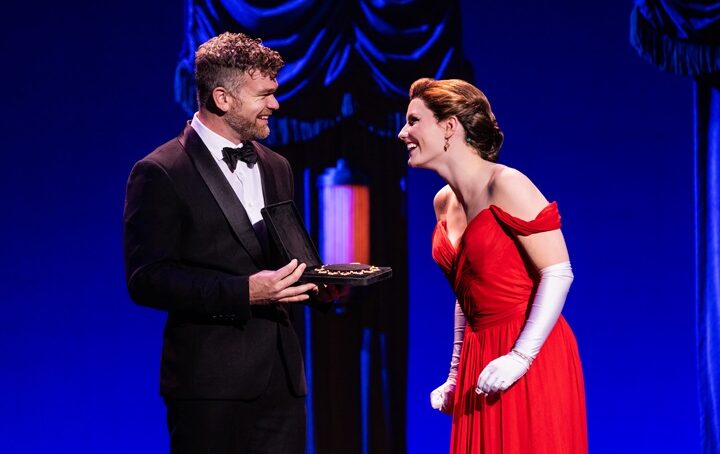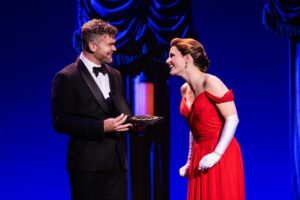

Photo by Matthew Murphy for MurphyMade
Chase Wolfe and Ellie Baker co-star in “Pretty Woman: The Musical” at the Adrienne Arsht Center. The touring stop in Miami runs through Sunday, Dec. 10.
By AARON KRAUSE
Fans of the hit 1990 romantic comedy film, Pretty Woman will be happy to learn that the stage adaptation is faithful to the film. In fact, the live show is so true to its source material that it is almost a copy of the movie with songs added. And, yes, the music includes Roy Orbison’s irresistible 1964 song, Oh, Pretty Woman, although you have to wait until the end of the play to hear it.
But staying for the whole show shouldn’t prove torturous; the stage adaptation is not as bad as some reviews indicated following its opening on Broadway. The songs, while not memorable or hummable, help the characters express themselves on a deeper level. And while the high-energy, rejuvenating, and moving stage show is faithful to the film to a fault, a couple of differences exist.
Currently, an impressive non-equity touring production of the live adaptation is playing in Miami. There, it remains at the Adrienne Arsht Center for the Performing Arts of Miami-Dade County through Dec. 10 before heading north.
There’s a good chance that you’re familiar with the movie. After all, it was the fourth-highest-grossing film of all time worldwide and made stars out of leads Richard Gere and Julia Roberts. But if you are new to the tale, some background may prove helpful.
In this modern update on Cinderella (with some Pygmalion/My Fair Lady thrown in), a prostitute and a wealthy businessman fall hard for one another in 1980’s Los Angeles, forming an unlikely couple. More specifically, while on a business trip in Los Angeles, Edward picks up a hooker, Vivian, after asking for directions. After Edward hires Vivian to stay with him for the weekend, the two grow closer. However, they realize they must bridge the gap between their different worlds if they are to remain together. While Edward and Vivian may be worlds apart, true love has a way of obliterating such a gap.
Love and dreams, two of the show’s themes, lend themselves to heightened forms of expression such as music. So, it is not surprising that someone turned the film into a musical. In particular, the music and lyrics are the work of Bryan Adams and Jim Vallance, while Garry Marshall and J.F. Lawton wrote the book. By the way, Lawton and Marshall wrote and directed the film, respectively.
The ingratiating, vivacious opening number, “Welcome to Hollywood” sets the energetic tone for the rest of the show. In addition, it presents a beginning that differs from the movie. While “Welcome to Hollywood” sings its praises, the following song, “Anywhere but Here” presents contrast. Unlike the opening number, the second song allows Vivian to express to us that Hollywood is “not my world,” and that she desires to be someplace else. So, practically from the beginning of the show, we learn something about one of its main characters (Vivian) who sings the “I Want” song, “Anywhere but Here.”
After that number, Edward sings a song that establishes Vivian as somewhat of an enticing mystery. The lyrics are simple but heartfelt:
I don’t know how I got here
She took me by surprise
She really is quite something
Much more than meets the eye
That was some negotiation
This girl can cut a deal
And I can’t help but feel
There’s something about her
I can’t put my finger on it
There’s something about her
I don’t know what it is, but I think I want it.
Now we have two characters who want something (she wants to get out of town and he wants her, while she wants him).
Of course, the main conflict that stands in the way of them getting each other is their vastly different worlds. Come to think of it, it wouldn’t have hurt to include a song about just how different their worlds are. While Edward and Vivian’s desire to unite may be a farfetched dream, they are in Hollywood, and “hopes and dreams are what this town is made of,” sings a character named “Happy Man” at the top of the show.
But Edward is also a happy man, thanks in large part to Vivian. But she makes him feel something else as well – she makes him feel free, as Edward sings in “Freedom.”
What a strange night
Yet, it feels right
How was I to know?
She would show me
Who I could really be
I can’t keep holding on
I’ve gotta let it go
Was that freedom, freedom
When we were dancing on the floor?
I felt freedom, sweet freedom
Live I’ve never felt before
And I know that I need more
For his work, Edward acquires and dismantles struggling companies and sells their assets for profit. In fact, Edward and Vivian are similar in that they “both screw people for money.” The line appears in the film and the stage adaptation.
In addition, the musical’s creators have retained memorable moments from the film, such as when Edward shuts a necklace box, leading to Vivian snorting and giggling. Also, the humor and characters from the film remain in the stage show.
The other characters include Kit, a hooker who is Vivian’s best friend and roommate; Phillip Stuckey, Edward’s attorney as well as close friend and confidant; Barnard Thompson, the manager of the Regent Beverly Wiltshire Hotel, a wary man who takes great pride in his position; and David Morse, a young man undergoing training to take over his family’s business (the same business that Edward is trying to acquire and dismantle.)
It can be a challenge to step into roles made famous by beloved, legendary movie stars. However, Ellie Baker and Chase Wolfe succeed as Vivian and Edward, respectively. The performers share strong chemistry and make the parts their own. You never sense even once that they are trying to mimic Richard Gere and Julia Roberts, the film’s stars.
Baker imbues Vivian with a free spirit, and makes her believably charming, fun-loving, endlessly energetic and joyful. In addition, when she needs to be, Baker’s Vivian is convincingly determined, vulnerable and assertive without being unlikable. In short, Baker makes Vivian a strong female character who is easy to pull for.
Meanwhile, Wolfe makes Edward elegant and driven without turning him into a cold and distant wealthy man whose only love is money. Rather, the actor makes us sense his character’s desire for connection and happiness that come with connecting and interacting with others. Also, like Baker, Wolfe has a heart-melting smile that further endears us to Edward.
In other roles, Rae Davenport shines as Kit, making her tough and commanding, yet warm, supportive, and kind. Also, Adam Du Plessis makes Happy Man a charismatic song and dance man.
Contrastingly, Liam Searcy makes attorney Philip Stuckey a cutthroat, aggressive attorney who wouldn’t hesitate to go for the jugular when making a kill is possible.
There is palpable tension between Searcy’s Stuckey and Baker’s Vivian during a scene late in the musical that differs from the film. In the movie, Stuckey hits Vivian and almost sexually assaults her. It’s hard to watch, especially in the era of MeToo. Contrastingly, in the live stage adaptation, Vivian hits the attorney after he tries to come after her. The action reinforces the fact that Vivian is a strong female character and we feel proud of her for defending herself.
Musically, the actors possess strong and expressive voices. A live orchestra ably accompanies them.
Behind the scenes, DB Bonds sensitively recreates the original Broadway direction and choreography by Jerry Mitchell.
The colorful lighting design by Kenneth Posner and Philip S. Rosenberg creates just the right ambience for scenes and helps focus the actors. And the costume design, by Gregg Barnes, helps contrast the different characters.
Christine Peters handles the tour scenic design from the original by David Rockwell. The colorful design places us in upscale environments and sets us in locales such as Rodeo Drive.
You may not leave the theater humming the stage musical’s songs. However, the adaptation offers a funny, touching, and romantic afternoon or night out at the theater. Further, stars Baker and Wolfe carry the night, offering performances that endear us anew to the main characters.
The non-equity national touring production of Pretty Woman continues through Dec. 10 at the Arsht Center, 1300 Biscayne Blvd. in downtown Miami. For information about ticket prices, show times, and future tour stops, go to https://tour.prettywomanthemusical.com.


